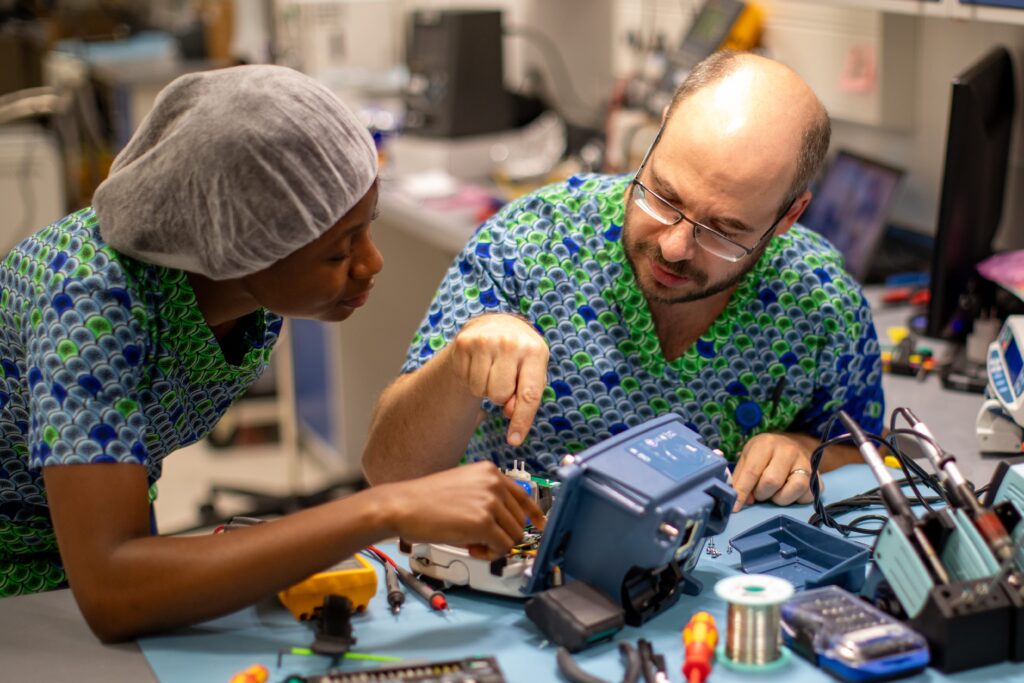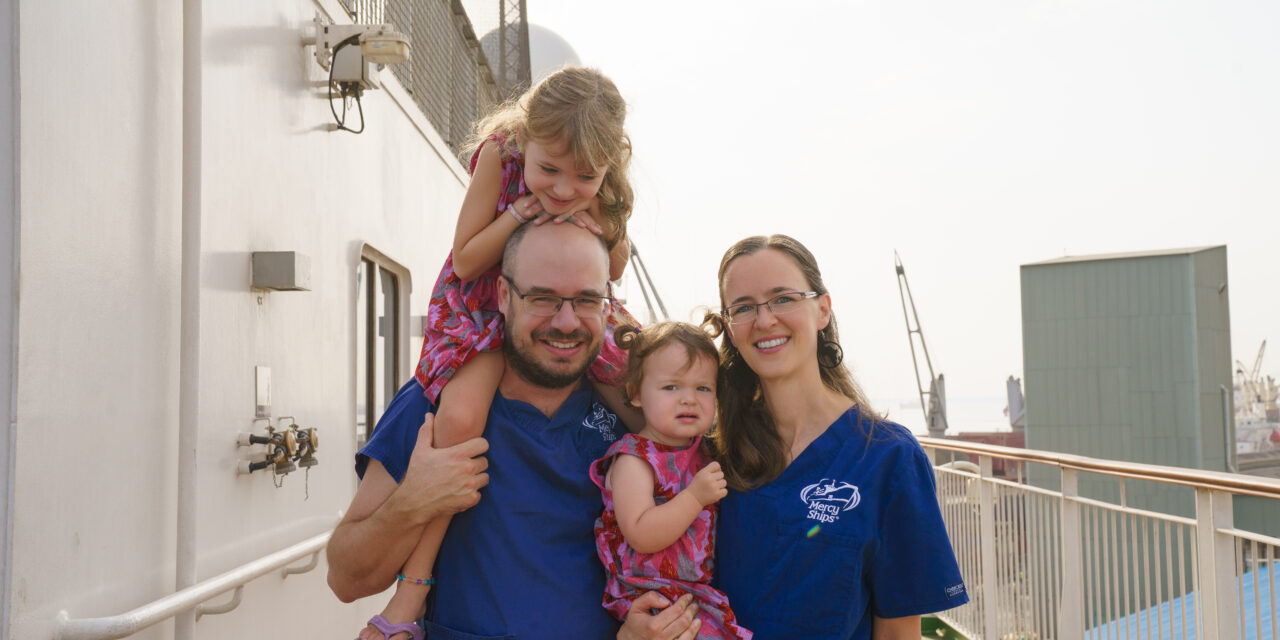Senior biomedical technician Christoph Nerz maintains the technology that makes surgery possible aboard Mercy Ships’ Global Mercy.
By Alyx Arnett
Most healthcare technology management (HTM) professionals work in hospitals anchored to one place. Christoph Nerz, a senior biomedical technician, works on the Global Mercy—a hospital ship that moves from port to port.
The vessel, which recently arrived in Freetown, Sierra Leone, for a 10-month field service, is Mercy Ships’ newest and the largest civilian hospital ship in the world. Nerz and his team maintain the Global Mercy’s medical equipment as part of Mercy Ships’ long-running volunteer effort to deliver surgical care in coastal Africa.
The four-person team oversees a technology suite that serves six operating rooms, radiology and dental clinics, and patient wards, making complex procedures possible for patients who might otherwise never have access to surgery.
“Helping patients is really something special. It brings so much meaning to what we do,” says Nerz.
The Path to a Floating Hospital
Nerz began his career in Switzerland, completing an apprenticeship in electronics before moving into research and development. He first worked in R&D at a large company and later at a smaller sensor manufacturer, where the hands-on environment gave him experience across production, quality issues, and IT support.
His introduction to Mercy Ships came through his wife, Mirjam, a nurse who had heard about the organization through their church. In 2015, when Mercy Ships urgently needed an electronics technician, the couple volunteered aboard the Africa Mercy for two years.
After returning to Switzerland, they later joined the newly built Global Mercy. There, Nerz formally transitioned into HTM, asking to join the biomed team in 2023. To support the move, he earned his certification through the College of Biomedical Equipment Technology while balancing shipboard life, volunteer work, and a growing family. He and Mirjam now have two daughters, Leonie and Lucy, living with them on board.
Managing a Modern Hospital at Sea
Leading an HTM team on a hospital ship presents unique managerial challenges, chief among them the constant rotation of volunteer staff. Team members may commit for a few months or several years, creating a dynamic that requires robust systems to maintain consistency.
To navigate this, Nerz relies heavily on standardization and thorough documentation. “We try to have procedures, for example. We use a tool, OneQA from Fluke, to write down our test procedures, and that really helps to standardize how we test stuff,” he says.

Communication adds another layer of complexity. With a multinational crew, everyone is expected to speak English, though accents—including Nerz’s own Swiss-German—and varying levels of fluency can sometimes create barriers. “Not everybody speaks perfect English, but you learn quickly once you’re here,” he says. For patients who don’t speak English, Mercy Ships relies on local “day crew” who come aboard to act as translators.
Nerz’s current team includes three volunteers: a newcomer from the United Kingdom, a technician from Ghana who has been aboard since January, and a returning volunteer from Nigeria filling in for a colleague on leave.
Resourcefulness in Remote Environments
Unlike land-based hospitals that can call on third-party service providers or order next-day parts, the Global Mercy team must be largely self-sufficient. Major repairs and upgrades are carefully planned around the ship’s schedule, with the vessel spending about 10 months in Africa before heading to a shipyard for service. For day-to-day issues, the team handles repairs themselves, with remote vendor support when needed.
“Normally, we try to buy in a way that we can run it on the ship right away,” Nerz says. “Sometimes we have to modify something if it’s not coming with the right cable or plug. Just recently, we rewired some feeding pumps so they’d work with 230 volts instead of 110.”
Nerz and his team have also started an exchange program with local biomeds in Freetown, visiting their hospitals and hosting them on board. The experience has been eye-opening, revealing the stark differences in infrastructure. “Here you don’t have any power outages typically, and those basics they have to worry about and turn on the backup generator and things like that,” Nerz says. “It’s a very different job they have.”
The Global Mercy team shares best practices while gaining an appreciation for the creativity required to maintain equipment in resource-limited settings.
A Mission-Driven Career and Community
For Nerz, the ship is more than a workplace; it’s a community of up to 600 people, complete with a school for his oldest daughter, a café, and a library. “Living in the community here on board is also something that I feel is pretty special,” he says.
In his free time, he likes to play volleyball on the ship’s dock and can take a company car into the city. He also enjoys visiting the patient wards and bringing his daughters when possible. “That’s really rewarding to see that it’s not just like a fancy product we design or something, but we actually are part of changing the life of the patients,” he says.
His time with Mercy Ships has taken him from field services in Madagascar, Benin, Cameroon, Senegal, and Sierra Leone to maintenance periods in Durban, the Canary Islands, and most recently Cádiz, Spain—experiences that have shaped both his adaptability and his perspective on the mission.
That combination of technical skill, resilience, and service also stands out to Mercy Ships’ biomedical services manager, Simon Bor. “Christoph is a skilled biomedical professional who looks for ways to improve processes, communicates issues and challenges effectively, and keeps me informed about what’s happening on board,” says Bor. “I’m grateful to have him on the team.”
Photo caption: Christoph Nerz with his wife, Mirjam, a nurse on board the Global Mercy, and two daughters, Leonie and Lucy.
Photo credit: Maxson Cobba





